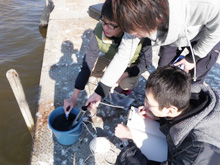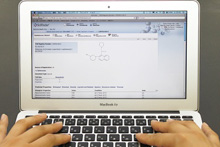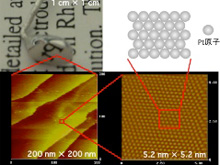Department of Applied Chemistry and Biotechnology
Overview
New Applied Chemistry; the key words are 'environment' and 'bio'
A sustainable society in the 21st century requires development of environmentally benign materials and environmentally benign chemical processes to produce them. To extract the functions of living things from the chemical standpoint and to develop materials and processes which utilize them or imitate them is an important direction to follow in today’s chemistry. The aim of this department is to promote understanding of materials, and chemistry behind them, and to train students to become experts on development of new materials and processes.
Educational Courses
After a year and half of common education, students are to select one of three courses, i.e., ‘biotechnology course’, which focuses designing and preparation of materials imitating or substituting the functions of living things, ‘applied chemistry course’, in which development of materials having new functions and advanced properties is mainly taught, and ‘sustainable chemistry course’, where emphasis is placed on environmentally benign materials and processes. Regardless which course they choose, students are allowed to take a variety of classes, the individuality of each student being at most respected.
Assignment to laboratories and undergraduate research
In the latter half of the third year, students are assigned to one of the 14 laboratories. In ‘bio-functional chemistry’ category, there are 4 laboratories: bioprocess chemistry and engineering, biomaterials, biomimetic polymer chemistry, and sustainable polymeric materials. ‘Sustainable organic chemistry’ category has laboratories of organic nano materials, fine organic chemistry, sustainable organic synthesis, and materials chemistry for energy conversion. In ‘inorganic and analytical chemistry’ category, there are laboratories of ceramic chemistry, chemistry and materials science under extreme conditions, analytical chemistry, and waste management. ‘Chemistry for efficient conversion of natural resources’ category has laboratories of chemistry of catalysis, surface electrochemistry, catalytic reaction engineering. Students are to learn fundamental as well as advanced knowledge and acquire wide viewpoints through seminars and undergraduate research.
After graduation
Students, upon graduation, pursue career in a wide range of industry, e.g. chemicals, materials, electronics, machine, information, and energy industries, as well as in local or state government. A large portion of students continue their education in the Graduate School of Engineering to obtain Master’s or Doctor’s degrees.



Curriculum
They are the main special subjects of the Department of Nanoscience.
1st grade
- fundamental chemistry A and B
- inorganic chemistry
- organic chemistry
- fundamental chemistry experiments
2nd grade
- physical chemistry
- chemistry of biomolecules
- polymer chemistry
- analytical chemistry
- environmental chemistry
- safety engineering
- chemical English
- experiments of analytical chemistry
3rd grade
- instrumental analysis
- biological polymer chemistry
- photochemistry
- outline of patent laws
- green chemistry
- experiments in applied chemistry and biotechnology
- seminar I
4th grade
- bio-functional science
- energy and resource engineering
- seminar II
- undergraduate research